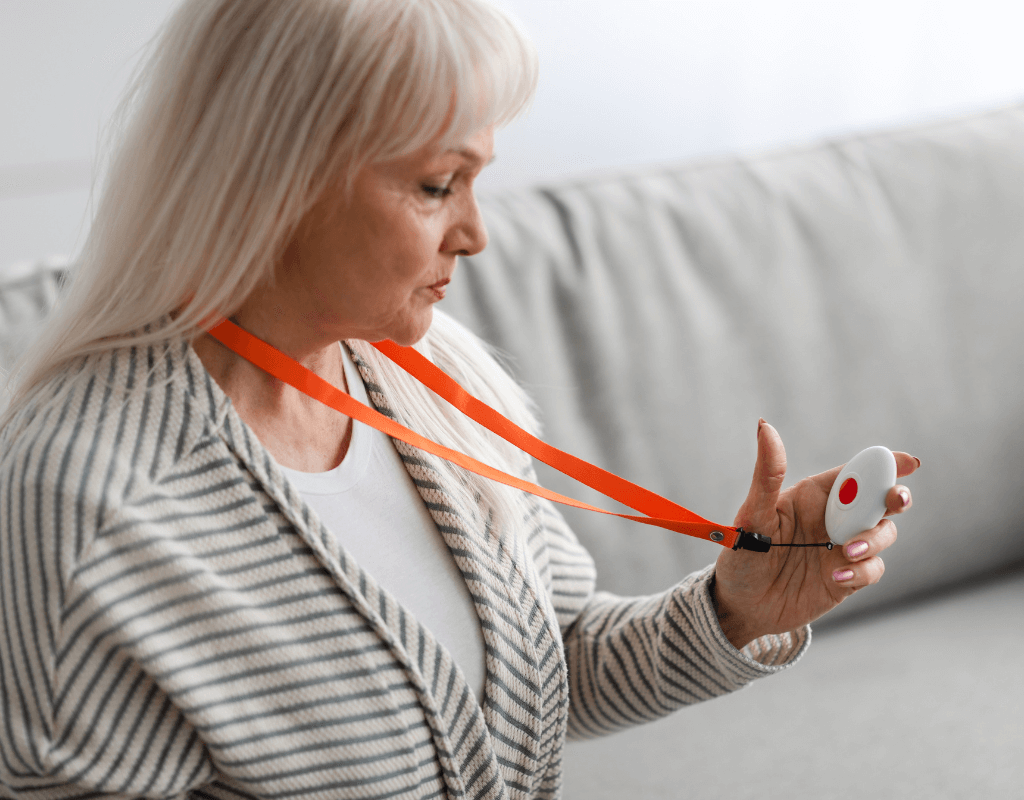In this article, I will show you the top 5 best medical alert devices for seniors. Think of these devices as personal emergency response systems that stand by 24/7, ready to spring into action if there’s trouble. They allow seniors the opportunity to maintain their independence and ensure their safety. But, they also provide you, the caregiver, with peace of mind.
Technology has greatly improved over the years. They’re not just simple buttons anymore; they are smart, connected devices offering sophisticated features like fall detection, GPS tracking, and even medication reminders.
If you’re considering a medical alert device for yourself or a loved one, it’s crucial to weigh several factors. Things to consider are the range of the device, battery life, and the types of emergencies it can handle. But don’t worry too much about the details now—I’ll help you sift through that shortly.
Above all, reliability and quick response times are non-negotiable when it comes to these devices. In an emergency, every second counts, so choose something that resonates with you in terms of trust and performance. Now, let’s delve into the top picks!
Top 5 Medical Alert Devices of 2024
I’m here to help you navigate through the top picks of 2024. I’m going to detail each product, focusing on their strengths to assist you in finding an option that resonates with you.
1 | Medical Guardian Alert Systems
Medical Guardian stands out for its versatility, offering a comprehensive range of devices for both home and on the move. They offer automatic fall detection, which is crucial in emergencies, and GPS tracking that supports an active lifestyle. But keep in mind, while they boast excellent customer service, and reliability, the monthly subscription might stretch your budget.
In-Home Systems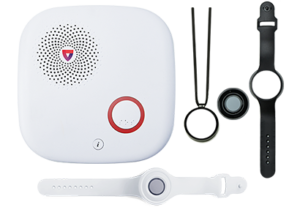
- MGClassic: Uses a landline connection, ideal for homes with poor cellular coverage. It includes a base station and a wearable help button (necklace or wristband) with a 1,300-foot range. It costs $29.95 per month with no equipment fee, and it has a 32-hour backup battery for power outages.
- MGHome Cellular: Similar to MGClassic but uses a cellular connection. It has a 1,400-foot range, and includes features like two-way audio and access to the MyGuardian portal. The monthly fee is $29.95, with a $149.95 equipment fee.
Mobile Systems
- MGMini: Offers GPS, Wi-Fi, and LTE location tracking. It’s compact and runs on Verizon’s network, making it highly portable. It includes a five-day battery life and costs $39.95 per month with a $149.95 equipment fee.
- MGMini Lite: A simpler version of the MGMini in a watch form factor. It has the same tracking features and costs $44.95 per month with a $149.95 equipment fee.
- MGMove: A smartwatch with features like step counting and weather updates, but lacks fall detection. It costs $39.95 per month with a $199.95 equipment fee.
See Reviews and Details
2 | Life Alert Medical Alert Systems
Life Alert is a heavyweight in the medical alert industry, recognized for dependability and a longstanding reputation. Their home-based system is simple, streamlined, and backed by around-the-clock monitoring, making it an easy choice for many. However, expect to pay a premium for the Life Alert name, and don’t count on a wealth of advanced features.
Pros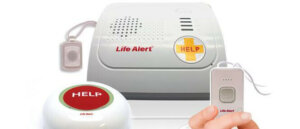
- Reliable Monitoring: Life Alert offers 24/7 monitoring with highly trained specialists, ensuring prompt responses in emergencies. Average response times are around 30 seconds, which, while slower than some competitors, is still reliable.
- Durable Equipment: The in-home wearables and GPS device are waterproof and have a long battery life, with the in-home pendants lasting up to 10 years without needing a recharge.
- Professional Installation: Life Alert recommends and provides professional installation, which can reduce the stress and ensure the system is set up correctly.
- Comprehensive Packages: The system includes a base unit, a wearable help button (necklace or wristband), and additional wall-mounted buttons, which have their own speaker, microphone, and LTE connection.
- Personalized Support: Life Alert provides care counselors to assist with setup and ongoing support, a unique feature not commonly found with other providers.
Cons
- High Costs: Life Alert is on the pricier side, with monthly rates ranging from $69.95 to $89.95, plus an activation fee of nearly $200. Additionally, they require a three-year contract, which might be a long-term commitment for some users.
- No Fall Detection: Unlike many competitors, Life Alert does not offer automatic fall detection, which could be a significant drawback for those at high risk of falls.
- Sales Process: Purchasing Life Alert requires speaking with a sales agent over the phone, which some users found to be a pushy and inconsistent experience. Additionally, there’s no online ordering option, which can be inconvenient.
3 | Bay Alarm Medical Alert Systems
The Bay Alarm Medical alert system is highly regarded for its range of devices, user-friendly features, and reliable service. Here’s a brief overview:
Key Features and Systems: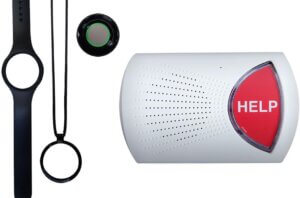
- SOS Home: This is Bay Alarm’s standard in-home system, which can be connected via a landline or cellular network. It includes a base unit and wearable help button, offering a range of up to 1,000 feet. Prices start at $24.95 per month for the landline version and $29.95 for the cellular version, with optional fall detection available for an additional cost.
- SOS Mobile: Designed for on-the-go use, this system includes GPS tracking and a speakerphone for two-way communication. It is water-resistant and offers a battery life of up to 72 hours. The cost is $34.95 per month, with fall detection available for an additional fee.
- SOS Smartwatch: This smartwatch offers discreet protection with features like GPS tracking, step counting, and optional fall detection. It’s ideal for active users and has a battery life ranging from 6 to 18 hours. The monthly fee is $34.95, with an additional cost for fall detection.
- SOS All-in-One: This comprehensive device combines the features of in-home and mobile systems, providing seamless protection wherever you go. It includes GPS tracking and a 72-hour battery life, with costs starting at $39.95 per month.
Pros:
- No Long-term Contracts: Bay Alarm Medical does not require long-term commitments, allowing users to cancel at any time without penalties.
- Reliable Monitoring: The system provides prompt response times and clear communication through its monitoring centers.
- Versatility: A variety of devices and bundles cater to different needs, whether at home or on the move.
Cons:
- One-time Equipment Fees: Some devices, particularly mobile systems and the smartwatch, have significant initial costs ranging from $99 to $159.
- Battery Life for Smartwatch: The SOS Smartwatch has a relatively short battery life compared to other devices, which may require more frequent charging.
Additional Features:
- Caregiver Tracking App: This app allows caregivers to monitor the user’s location and device status, providing real-time updates and alerts.
- Emergency Features: Devices come with options like fall detection and wall-mounted buttons for high-risk areas like bathrooms and stairways.
See Reviews and Details
4 | Philips Lifeline Medical Alert Systems
Stepping into the ring with pioneering technology is Philips Lifeline. They introduced AutoAlert fall detection, pushing the envelope in the industry. Philips Lifeline is synonymous with reliability, and for those managing medications, they even offer a dispensing service. The hitch? Premium services come with premium prices.
Features: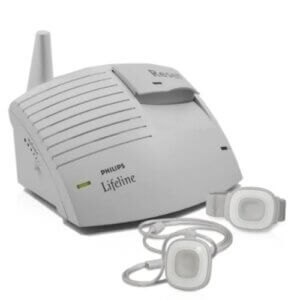
- HomeSafe Systems: Available in both landline and cellular versions, these systems are ideal for at-home use. The setup is straightforward, and Philips offers an optional professional installation service.
- GoSafe Systems: Designed for active seniors, these systems offer both in-home and mobile coverage. The GoSafe 2 device automatically connects with the home base station when in range and operates as a mobile alert system when away from home.
- Monitoring: Philips Lifeline operates monitoring centers in the U.S. and Canada, staffed 24/7 by trained professionals. The average response time is about 12 seconds.
- Fall Detection: Available as an add-on feature for enhanced safety.
- Lifeline Cares App: This app allows caregivers and family members to create personalized care plans, manage device settings, and receive notifications.
Costs:
- Monthly Fees: Range from $29.95 to $58.95, depending on the system and features.
- Activation and Installation Fees: There is a one-time activation fee of $50 and a self-installation fee of $19.95. Professional installation by a technician costs $99.
- Device Fees: The GoSafe 2 device has an additional one-time fee of $99.95.
Advantages:
- Easy Installation: Most systems are user-friendly and come with clear instructions and online resources. Professional installation is available if needed.
- Comprehensive Coverage: Both in-home and mobile options ensure users are protected everywhere.
- Caregiver Support: The Lifeline Cares app provides tools for caregivers to manage and monitor the user’s safety and well-being.
Disadvantages:
- Cost: Philips Lifeline is relatively expensive compared to some competitors, particularly with the additional fees for activation and professional installation.
- Equipment Fees: The one-time device fee for mobile systems can add to the overall cost.
5 | MobileHelp Medical Alert Systems
The MobileHelp medical alert system caters particularly well to the actively aging population with its GPS-enabled devices. Fall detection and two-way communication are on-point, ensuring help is just a call away. However, as you enjoy the freedom it affords, be aware of the potential extra costs and the occasional connectivity hiccup in less populated areas.
Read my detailed review of MobileHelp Medical Alert Systems for more information.
Pros:
- Affordable Pricing: MobileHelp offers plans starting at $19.95 per month, making it one of the more cost-effective options in the market.
- Variety of Systems: It provides multiple systems to cater to different needs, including in-home and mobile units. Notable systems include the MobileHelp Classic, Solo, Micro, Touch, and Duo.
- Innovative Features: The MobileHelp Touch is a tablet-based system that offers games, activity tracking, and medication reminders in addition to traditional safety features.
- Caregiver Tracking: I personally LOVE THIS FEATURE! The caregiver portal allows loved ones to track the user’s location and activity, enhancing peace of mind.
- Long Range: The at-home units have a connectivity range of up to 1,400 feet, which is quite extensive compared to other systems.
- Comprehensive Monitoring: MobileHelp provides 24/7 monitoring services with U.S.-based call centers that offer multilingual support through LanguageLine.
Cons:
- No Free Warranty: Equipment warranty is not included unless you pay an additional $5 per month for the Connect Premium package.
- Additional Device for Fall Detection: Fall detection requires wearing an additional pendant or wrist device, which might be cumbersome for some users.
- No All-in-One Device: Unlike some competitors, MobileHelp does not offer a single device that combines multiple functionalities, necessitating the use of multiple components for comprehensive protection.
Noteworthy Systems:
- MobileHelp Duo: Ideal for couples, offering two mobile units at a slightly higher price than a single unit, providing significant value.
- MobileHelp Micro: A compact mobile alert device with built-in GPS but not compatible with fall detection.
See Reviews and Details
Choose One That’s Right For You
While some devices like MobileHelp start at a friendlier $19.95 per month, costs can spiral with added features. Then there’s Life Alert with a steeper monthly fee, which might be justified by their brand reliability. Be sure to peek at those add-on costs and don’t get caught by surprise.
Choose something that resonates with you. Active seniors might find MobileHelp’s mobile options liberating, whereas homebodies can consider Bay Alarm Medical’s in-home systems. Caregiver tracking features may sway your decision if family oversight is a priority.
Remember, no initial choice is chiseled in stone. Flexibility is key, and thankfully, the medical alert device market caters to that. If you’re still uncertain, don’t hesitate to reach out to the companies for more info. Discuss options with healthcare providers or caregivers for additional insights. Most importantly, once you’ve made a choice, test your system regularly and stay familiar with how it works so it’s second nature when you really need it.
Here’s a little transparency: Our website contains affiliate links. This means if you click and make a purchase, we may receive a small commission. Don’t worry, there’s no extra cost to you. It’s a simple way you can support our mission to bring you quality content.
Recommended For You

12 Steps To Reduce Caregiver Stress
If you are reading this article, chances are you are a caregiver and you are stressed out! I’ve been there. Being a caregiver is one of the most selfless and …

Home Care Contract Template
There are many details to consider and things to discuss with the rest of your family when agreeing on a strategy for caring for your loved one. A caregiver agreement or contract is a great tool to ensure you, your loved one and your caregiver know what to expect from
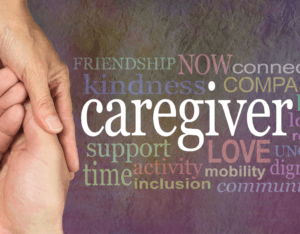
How To Care For A Caregiver
If you are, or have been a caregiver, you know that caregiving is a labor of love. Your work is often performed in the shadows without much recognition. While caregivers …
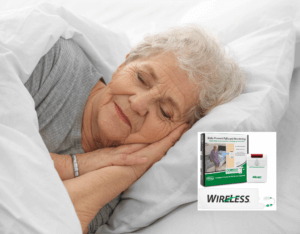
Smart Caregiver Bed Alarm Sensor Pad – For Peace of Mind
I know many caregivers who are caring for someone who is at risk of falling or wandering off. This can be a challenge and puts a lot of stress on …

Characteristics of a Good Caregiver – The Top 6
What are the characteristics of a good caregiver? Whether you are hiring a private caregiver or one through an in-home care agency, you want to know. I owned an in-home care agency and hired hundreds of caregivers over the years. Some were good, some were great and then there were

COVID-19 and Caregivers
If you watch the news for even a minute these days you will undoubtedly be bombarded with information about COVID-19 (the coronavirus). I also know that the demands of caring …

